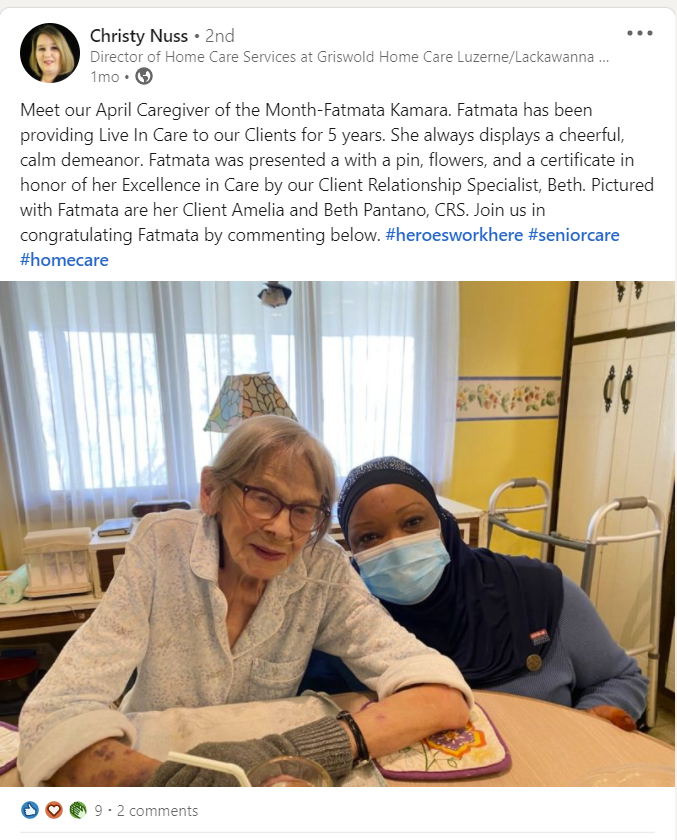Why Many Agencies Fail to Create a Good Culture, and How You Can Succeed

Good company culture can impact every area of your agency, including recruitment, retention, and satisfaction. Here’s how to stay on top of it.
They also provide excellent opportunities for advancement, while showing employees the meaning and power behind the work they’re doing. One example of this is their Googler-to-Googler program which allows employees to coach each other (kind of like a caregiver mentor program).
While the needs and scope of a home care agency are very different from Google, the principles of what makes a good culture are universal because they’re based on what brings people fulfillment.
Here’s why some agencies are missing the mark and how you can stand out.
The problem
Many agencies fail to create a good culture, but probably not for the reason you think. It’s easy to assume that it’s too difficult to create a good culture among a remote workforce of short-term or part-time employees; however, that’s simply not the case.
Care Advantage Inc, for example, has successfully maintained low caregiver turnover rates and built a reputation for strong culture across its 25+ locations, even during the pandemic.
With retention being high, it’s clear that Care Advantage is doing something right, and creating a culture that caregivers and other staff want to be a part of.
We work with thousands of agencies to help them manage the employee experience. While it’s easy to try and blame unsatisfactory culture on one big thing, we’ve noticed a set of several contributing factors that come up often.
Viewing caregivers as replaceable commodities instead of priceless assets is perhaps the most significant.
Turnover in the home care industry is high, and with caregivers continuously coming and going, it’s easy to focus on just getting the job done rather than building a culture among your staff. The thing is though, the more emphasis you put on your staff and the value they provide your agency, the happier they’ll be – which ultimately leads to lower turnover rates.
Another reason some agencies don’t have a strong company culture is because they’re not using data to make decisions. If you’re not quantifying employee satisfaction, there’s no good way to measure the impact of initiatives to know what’s working and what’s not.
Additionally, there are a lot of agencies that set a goal based on the outcome they want to see but don’t establish a vision or develop a plan along with it, meaning there’s not a strong follow-through. In the long run, this can cause confusion among staff.
Any disorganization, lack of clarity, or misalignment between management and staff could cause problems and hurt the company culture.
So, why is having a good company culture important?
In a recent Entrepreneur article, Gordon Tredgold shared that “every year, Gallup runs an engagement survey that shows that, on average, 64 percent of employees are disengaged. Odds are, unless you’re No. 1 in your sector, nearly two-thirds of your staff are disengaged. Not only that, but 15 percent are actively disengaged. In other words, if your business was a boat, for roughly every two individuals that are rowing hard towards your goals, one employee is rowing the opposite direction — and the rest are just passengers.”
You don’t want your employees to just be passengers (or even be rowing in the wrong direction). Engagement sets the framework for a strong company culture and when everyone isn’t aligned, there’s no easy way to move forward.
Employee engagement is the basis of creating a good culture. Without it, it’s hard to see any growth at all.
On top of that, employee engagement will naturally lead to improvement in all the most important areas of running a home care agency – recruitment, retention, satisfaction, etc.
In the home care industry, margins are often low and there’s not always a lot of room to pay more or offer a wide range of benefits. Employee engagement is one way you can differentiate yourself from other employers in the area.
When employees are more engaged in their company and enjoy the culture, there’s a higher chance of them becoming advocates.
How to build a positive company culture
#1: Start from the top down
Good culture starts with management.
While there are a lot of skills that managers need to have, effective people skills are among the most important. Of many things, they should be good at communication, delegating, handling issues, and building rapport.
Management can also have a heavy influence on culture by being intentional about making their own lives/behaviors mirror the culture they want to create. Setting the example is the best way to get everyone else on board.
#2: Hire the right people by focusing on your core values
When going through the recruitment process, you should be emphasizing your core values and vetting candidates based on them.
At Activated Insights, we prioritize finding people who meet our core values by having hiring teams rate candidates based on how well they appear to meet the core values. We truly do hire, fire, review, recognize, and reward-based upon them.
When you’re filling your open positions with the right people, and not having to instill these values in employees down the line, a positive company culture will naturally evolve as more and more people come on board.
An important note: A good company culture isn’t created by just one person. It takes a collective effort to truly make a difference.
#3: Track satisfaction
Employee satisfaction is the number one indicator of how successful your company culture is.
While culture is hard to track, measuring employee satisfaction is a quantifiable way to see the impact of your culture.
#4: Implement feedback loops
Feedback loops allow room for your staff to express their concerns, ideas, or likes/dislikes about your agency. When you’re consistently getting feedback, there’s plenty of room to address any issues before they escalate into a bigger problem.
And while being open to feedback is crucial, it’s important that you have more than just an open-door policy. You need to actively seek feedback, not just wait for it to come. And when it does, you need to listen and take action to prove that you take it seriously.
Even if something doesn’t seem like a priority right now, allowing your staff to openly communicate their feelings is crucial.
#5: Give frequent employee recognition
Recognition can go a long way in how engaged or satisfied a caregiver is with your organization. Personally, when I have someone recognize me for the work I’m doing, I’m much more confident and enthusiastic.
A key part of culture is learning the specific ways that your team prefers to be recognized, and doubling down on those.
If your caregivers are doing an outstanding job, or are getting praises from clients, share that. Whether you have a board in your office with a photo for the “caregiver of the month”, or you are sharing on social media, recognition is important.
Here’s an example of social media recognition that you can start using to improve your company culture:

Creating value through culture
While building a strong company culture will look a little different for every agency, the bones are still there. No matter what, there are things you’ll be able to do that will act as stepping stones into further growth and development.
When you’re able to build out a cohesive team that is happy and aligned, they’ll likely want to stay and continue with your organization. It’s important that your staff feels like they’re being heard and listened to on a continuous basis.
There’s no doubt that workplace culture influences retention, but it can also help in attracting the right staff. A good culture heavily influences the value employees place on their work, and it’s likely they’ll start to see your agency as a long-term destination for their career.








